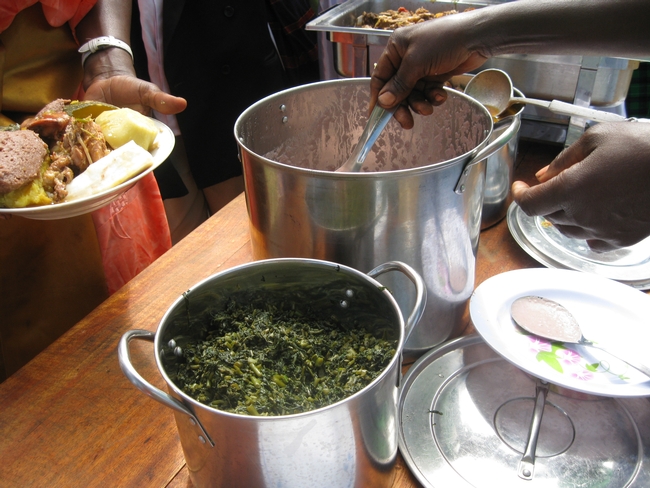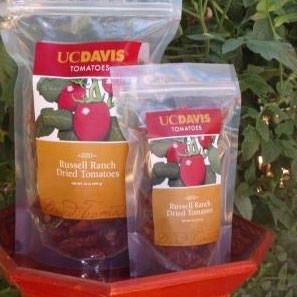Posts Tagged: Kate Scow
More African vegetables on more plates
What will be the new food frontier? An article in the Wall Street Journal with the headline “Next Stop for Food Fanatics: Africa” predicts adventurous American palates may soon be craving sub-Saharan cuisines.

Have you heard of these?
- Nakati (Solanum macrocarpon, S. aethiopicum) Also called African eggplant, some types of nakati are eaten for their leafy greens, while others are eaten for their fruit (which can look like a tomato or eggplant).
- Cowpea leaves (Vigna unguiculata) This plant produces black-eyed peas, but the greens of the plant can also be eaten as a vegetable.
- Bbuga (Amaranthus Gracecizans) You might know this plant by its common American name: pigweed.
- Doodo (Amaranthus Dubius) Like bbuga, this type of amaranth is eaten for its leaves in many parts of Africa. In North and South America, varieties of amaranth are usually used as a grain.
- Jjobyo (Gynandropsis Gynandra, Cleome gynandra) Also called spider plant.
Many of these indigenous vegetables are rich in micronutrients such as iron, vitamin A and vitamin B. When it comes to alleviating malnutrition in developing countries of eastern Africa, indigenous vegetables offer workable solutions because they are not only nutritious, but also familiar to the region’s eaters and farmers.

Recently U.S. researchers have been working with indigenous crops like these in east African countries — with funding and support from the Horticulture Collaborative Research Support Program (Horticulture CRSP), led by Beth Mitcham at UC Davis with funding from USAID. In Kenya, Tanzania and Zambia, Stephen Weller of Purdue University is leading a Horticulture CRSP research project on production practices, seed resources, postharvest handling, marketing and nutrition of varieties of amaranth, spider plant and African nightshade.
In Uganda, Kate Scow of UC Davis is partnering with local groups to try out a new model of extension while increasing production of indigenous greens, such as nakati, bbuga and jjobyo.
Take a look at this short video for a little more background:
Just as bok choy, an Asian vegetable, has become familiar to many American households, perhaps one day you’ll find nakati or another African leafy vegetable on your plate.
In the meantime, researchers with Horticulture CRSP are working to get more African leafy vegetables into the research agendas, fields, markets and plates of our counterparts in eastern Africa.
Read more abut Horticulture CRSP and its projects around the world at http://hortcrsp.ucdavis.edu.
Dried tomatoes are a healthful stocking stuffer

Russell Ranch Dried Tomatoes are grown at UC Davis' Russell Ranch Sustainable Agriculture Facility, a 300-acre farm west of campus. The organically grown tomatoes are part of a century-long study of agricultural sustainability at the ranch that compares the long-term effects of different ways of farming.
Research at Russell Ranch focuses on soil and water quality, nutrient cycling, pests and profitability.
“We developed this product to help meet a campus desire for more locally grown food. We also wanted to share with those on and off campus what’s happening at Russell Ranch. It is unique for a research farm of this size to be entirely dedicated to a century-long study of agricultural sustainability, and it is the only one of its kind in Mediterranean ecosystems,” said Kate Scow, director of Russell Ranch, which is a program of the Agricultural Sustainability Institute at UC Davis.
After years of selling tomatoes off campus, Russell Ranch staff began working with UC Davis Dining Services as it sought more sources of locally grown food in order to reduce the carbon footprint of food served on campus. For the past two years, freshly harvested Russell Ranch tomatoes have been used in the Russell Ranch Roasted Tomato Sauce that accompanies a variety of dishes - from pizza to polenta and ratatouille - served on campus.
This year, Russell Ranch staff developed a new limited-quantity product that can be enjoyed on and off campus.
Russell Ranch Dried Tomatoes are also available at the Memorial Union Coffeehouse, the UC Davis Medical Center and for purchase through the UC Davis Bookstore.
$4 for a 2.75 oz. bag
$12 for a 9.75 oz. bag